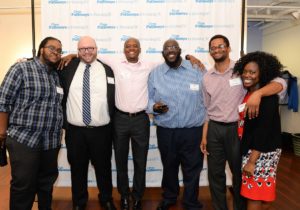 Pathways to Housing DC was founded to positively transform the lives of people experiencing chronic homelessness, who are also living with serious and persistent mental illness and challenging health conditions. For the past decade, we have successfully engaged, housed, supported, and treated over 850 adults who had been living on the streets for years. As an alternative to a system of emergency shelter/ transitional housing, our model is simple: provide housing first, and then combine that permanent housing with supportive treatment services in the areas of mental and physical health, substance abuse, education, and employment.
Pathways to Housing DC was founded to positively transform the lives of people experiencing chronic homelessness, who are also living with serious and persistent mental illness and challenging health conditions. For the past decade, we have successfully engaged, housed, supported, and treated over 850 adults who had been living on the streets for years. As an alternative to a system of emergency shelter/ transitional housing, our model is simple: provide housing first, and then combine that permanent housing with supportive treatment services in the areas of mental and physical health, substance abuse, education, and employment.
While the model is simple, the Housing First Program is very complex and requires dedicated staff to coordinate all aspects (outreach, housing, healthcare, treatment and case management) of the program in order for the people we serve to be successful in their recoveries. Housing First means there are no conditions that have to be met before the person moves in. Housing is provided in apartments that are spread throughout the District, with each client holding their own lease. Using “scattered sites,” we are able to give each client choice in where they would like to live, helping to foster a sense of home and self-determination. Stable, supportive housing is merely the first step towards reintegrating into their community, rebuilding family relationships, reconnecting with their faith fellowships, and experiencing an improvement in overall physical health and psychological wellbeing.
After receiving housing first, every client is matched with a support team (Assertive Community Treatment Team, Veterans Housing First Team and/or Permanent Supportive Housing Team) comprised of psychiatrists, nurses, social workers, certified addictions counselors, employment specialists, and peer health specialists. The team works together to provide comprehensive community-based treatment and support services around the clock, with a focus on integrating both health and social well-being into the recovery plan. These vital interventions are designed to empower client choice and support successful independent living. Using this model, we have been able to maintain a housing retention rate of at least 91% with clients who have traditionally been viewed as “treatment resistant,” and “not ready for housing.” We believe that housing is a basic human right, that anyone who says they want a safe place to live is “housing ready,” and that virtually all people can be successful in housing with the proper combination of supports. Our success using the Housing First model demonstrates that the vast majority of people we connect with permanent supportive housing stay in that housing and on the path to recovery.


 Pathways to Housing DC was founded to positively transform the lives of people experiencing chronic homelessness, who are also living with serious and persistent mental illness and challenging health conditions. For the past decade, we have successfully engaged, housed, supported, and treated over 850 adults who had been living on the streets for years. As an alternative to a system of emergency shelter/ transitional housing, our model is simple: provide housing first, and then combine that permanent housing with supportive treatment services in the areas of mental and physical health, substance abuse, education, and employment.
Pathways to Housing DC was founded to positively transform the lives of people experiencing chronic homelessness, who are also living with serious and persistent mental illness and challenging health conditions. For the past decade, we have successfully engaged, housed, supported, and treated over 850 adults who had been living on the streets for years. As an alternative to a system of emergency shelter/ transitional housing, our model is simple: provide housing first, and then combine that permanent housing with supportive treatment services in the areas of mental and physical health, substance abuse, education, and employment.